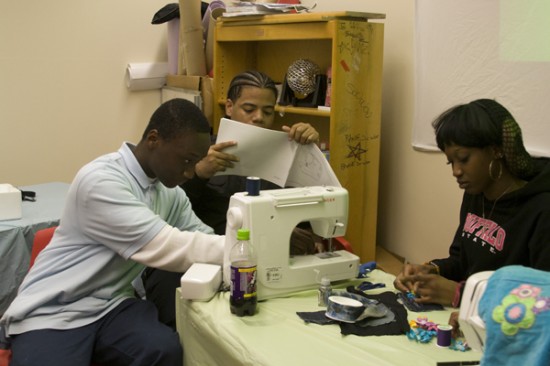
Throwaways become the basis for a fashion business
The adage “One man’s trash is another man’s treasure” is being given new meaning by a group of high school seniors working with SoBRO, the South Bronx Overall Economic Development Corporation.
The students are starting a fashion business that will recycle hand-me-down clothing and plastic soda containers to make handbags, pencil holders and change purses.
The project, called Green Goes Greener 2010, is an add-on to SoBro’s In-School Youth program—a year-round after-school program that provides career planning and work-readiness training to low-income students.
‘We challenge students to answer questions like, “How does scrap fit into the fashion industry? What is eco-friendly?” said Wanda Echevestre, a youth advocate for the In-School Youth program who has worked at SoBRO for three years. Echevestre believes this effort is not only important as a way for young people to learn about the environment, but also because it gives the students the opportunity to learn new skills, from threading a needle to learning to sew to operating a sewing machine.
Programs for all ages
By Alex Green IV
SoBRO offers a number of environmentally conscious initiatives, in addition to the In-School Youth Program. Others include:
• Education for Life (E4L), a program for youth between the ages of 16 and 24 who are not in school, provides pre-GED training and education, work readiness and job training. As a special project, students in the program worked for 2-3 weeks to create “green” trophies made of cardboard and crafted in the shape of trees that were given to honorees for their contribution to greening initiatives in the Bronx at this year’s Get Green South Bronx Earth Fest in St. Mary’s Park.
• Ready for Life (R4L), a program for youth between the ages of 16 and 24 who are not in school offers GED preparation and training as well as college preparation. Ready for Life also offers a green construction training component.
• Community Service Initiative (CSI) is an after-school program open to students between the ages of 13 and 21 who are asked to design a community service project. Students participated in the “Music Gets Me Green” song contest at the Get Green South Bronx Earth Fest.
• Emerging and Transitional Workers Grant is a partnership between SoBRO and the Consortium for Workers Education for up to 130 students who participate in free adult basic education and green jobs training and receive job placement services. It includes a focus on green building, renewable energy and clean water.
“Kids nowadays don’t know how to do stuff like that,” she said.
“This program opens up a new world. It’s good to learn different skills and how to communicate better with people,” said Kimberly Guity, one of those who has learned how to sew. A high school senior at Theodore Roosevelt High School, Guity, 18, has been in the SoBRO youth program since September. She says she is more conscious of recycling in her everyday life as a result saving and reusing materials in the program.
Now, “When people litter and they put it in the wrong bin, I always try to inform them of the proper place,” she said.
The students hold a clothing drive at SoBRO every Wednesday to replenish their supply of old clothing. Sometimes they bring costume jewelry from home to accessorize some of the items that they make.
“I learned how you can make things out of old things; you don’t always have to make something new,” said Leah Saxon, 18, a high-school senior at Morris High School for Violin and Dance. Saxon joined the In-School Youth Program when she was in 10th grade. She says that she has learned how to write a resume and cover letter and how to do some secretarial work, and that the program has helped her get a part-time job at Bloomingdale’s department store.
“I like fashion—fashion is my everything,” Saxon said.
But for other students in the program, it’s the idea of preserving the environment that motivates them. Davon Hanley, 18, a senior at the Evander Child High School of Computer and Technology, who fashioned a high-heel shoe from an old 2-liter plastic bottle and a necklace out of bottle caps, says his work is collectible, rather than wearable.
“Fashion is not for me,” he said, but he believes the program is important because “you’re actually doing something to help somebody else.”
